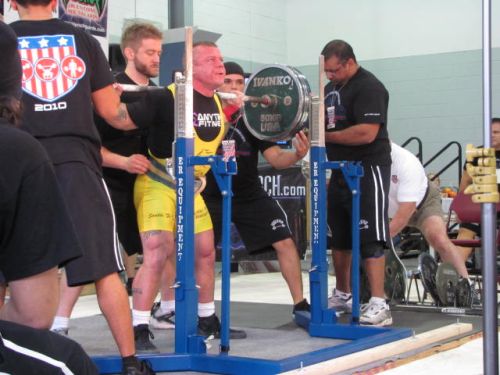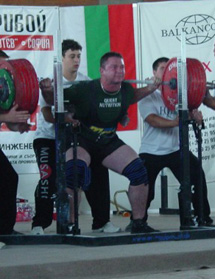Autoregulation -- the New Trend in Training
by Mike Tuchscherer

My life is not a science experiment. Yours isn't either. I have a real family, a real job... real priorities. And if you're honest, I bet you do too.
You see, as I continue to research training, I'm reminded that life doesn't occur in a bubble. Just because one theory proves to be sound in concept doesn't mean it actually works that way in real life. Why? Because "real life" often encompasses a laundry list of variables that aren't accounted for during the conceptualization stage.
I'm willing to bet that if you look back over your training logs for as long as you've been keeping them, you won't find a single twelve week period where everything went according to plan. There was at least one night where you didn't sleep well, at least one sick day, at least one day where you fought with your spouse. And chances are, during an average training cycle, this happens more like once a week. Sometimes more.
And on the flip side of that, have you ever had a training week that you expected to wear you out, but you cruised right on through it? Why did that happen? Wouldn't it be nice to take advantage of those times as well?
That's not to say that science is worthless; quite the contrary. What I am saying is that optimizing the training process demands that as many variables as possible be accounted for. Now, it's important to note that "optimal" is an ideal -- not something that is likely attainable. There is always something we can do better, so we strive to achieve it.
Accounting for unexpected variables in training is referred to as Autoregulation. That is to say that the training Automatically Regulates itself to what the body is prepared to handle on a given day. You've heard people say, "Let the body be your guide"? They are talking about Autoregulation. If you aren't autoregulating your training in some way, then you aren't having highly effective training over the long term. Anybody who claims gains "as fast as humanly possible" but ignores autoregulation cannot possibly be referring to everyone, much less you!
BUT! If you learn to autoregulate the training process to fit your needs and current abilities, then you can be sure that you're making improvements as fast as you can. There are a ton of ways to autoregulate the various parts of the training process. You can autoregulate the load, the volume, the reps, how much stress is involved, and so on. And you can do this based on a wide number of different factors.
Since autoregulation is interesting to me, of course I have worked within RTS to develop and enhance my understanding of how autoregulation works, which methods are effective, why, etc. We are always coming up with new ways to autoregulate the training process. Here are a few methods that we currently employ to autoregulate the training process.
RPE's
RPE's are basically a subjective rating of how hard a set feels. I've written on this a lot, so if you are unfamiliar with RPE's, I'd suggest looking at some earlier articles or possibly the RTS Manual.
Using RPE to govern how much weight to put on the bar is very effective. This will make sure that you precisely as heavy as you need to go to achieve your goal for the session. But to understand exactly why that's helpful, you need to understand what happens if you get it wrong.
If you go too heavy, most athletes run the risk of "missing" or training to failure. While that's not always a bad thing, doing it too much causes too much stress to the body, impairs performance, and can even lead to injury. And on the flip side of that, if you train too light, you never stimulate the muscular system to its full potential. Gains like that will be minimal.
By using RPE's to govern the training load, you're sure to get the right bar weight every time. Good day, bad day... everyday. Over time, this will make you noticeably stronger than "just guessing" at the proper training load for a particular session.

Fatigue Percents
Again, Fatigue Percents are explained in detail in the RTS Manual, The Seminar DVD, and in a few free articles on the site. Because of that, I don't want to bore most of you with yet another explanation of what Fatigue Percents are. The basic concept is that you observe how your body responds from set-to-set in a training session, you can control how much fatigue (stress) you put on your body.
The major training benefit of using Fatigue Percents is that you autoregulate the training volume based on how much stress you want to induce on a given day. If you didn't sleep well last night, you will fatigue faster and thus do less volume in a training session. If everything is going well for you and you are in good shape, your volume in a training session will automatically go up in proportion to how your body is handling it.
The thing that sets Fatigue Percents apart from manual volume adjustments is that Fatigue Percents take the whole body into consideration. Nutrition, sleep, fatigue from the last workout, energy systems, etc, etc... it all plays a part in how much volume you should do on a given day. Fatigue Percents account for this beautifully by giving you the precise volume dose you need to have on a given day.
TRAC
This is the newest tool that we have developed for RTS. It is a simple test done each morning that provides the user with a daily report on how much total stress the body is dealing with, the status of their CNS, and their current level of adaptive reserves. Also included in the report are specific recommendations on how to adjust today's training based on your test results.
TRAC represents a big leap forward in training efficiently. There are days when the body is not processing stressors very well. When you have days like this, it is best to reduce the stress of the day's training. Knowing the potential of your CNS can give you a ton of insights on your training. It can be one indicator of readiness (tells you when it's time to train). It can tell you which exercises are taxing on the CNS. It can help guide your recovery methods. It can also tell you when to back off from heavy weights or when to push it in your training.
Using TRAC has represented a big step forward in training correctly and productively. There have been numerous times when TRAC disagrees with my subjective feelings on how I should train and other times when it agrees completely. The point is that I almost always listen to TRAC because it is an objective measure of how my body is doing. It doesn't get lazy. It doesn't fly off the handle. It just tells you how your body is doing so you can train in the most efficient way possible. For more information, click here.
These methods have made a big impact on how we go about training and the gains we see from it. And why wouldn't it? It custom-fits your training to what you're body is capable of handling. And that's what YOUR body needs.
Mike Tuchscherer is the owner of Reactive Training Systems, a company dedicated to individualized physical training. The goal of RTS is to help you become a dominant force in your sport! Learn more by visiting www.ReactiveTrainingSystems.com.
Mike himself is an accomplished Powerlifter. He has over 12 years of experience training and researching the best training methods in the world. Mike has competed in raw and single ply competitions. He recently won the Gold medal representing the USA at the 2009 World Games; becoming the first American male to ever win this distinction. His best lifts in IPF competition are a 903 squat, a 644 bench press, an 826 deadlift, and a 2342 total in the 275 pound weight class.
More Articles By Mike Tuchscherer
Return to the Workout Articles Archive
|